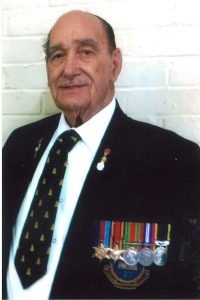The family of William G Arthur has recently informed us of his death.
 Will Arthur died peacefully and bravely on 18th June 2013, aged 92, after suffering a lengthy debilitating illness.
Will Arthur died peacefully and bravely on 18th June 2013, aged 92, after suffering a lengthy debilitating illness.
At the age of 14, he joined the Queens Army Cadet Company and then signed up as a Territorial in the 2nd Battalion of the London Irish Rifles in 1939 at the age of 17 finally being called to the “Colours” in August 1939 in anticipation of the inevitable war.
For 2½ years, he was assigned to guarding strategic assets such as railway bridges around the UK before being transferred to the 1st Battalion Royal Inniskilling Fusiliers, embarking for India shortly afterwards. Following the loss of Burma to the Japanese, William was part of the reinforcements to bring the Battalion back up to strength as a third were lost during the earlier defeat.
In late 1943, the Battalion was again sent into Burma, this time to advance down the Mayu Peninsula to establish a forward base, the rugged terrain and narrow width of the peninsula presented problems from the start for the Battalion. These problems, together with no reconnaissance or air support, resulted in delays which allowed the Japanese to fortify the peninsula, the Battalion launched many determined but unsuccessful attacks, eventually being overrun by the enemy and were forced to escape in small groups through the jungle, where many became hopelessly lost or were killed by the Japanese.
It was during this retreat, in February 1943, that William was shot and wounded. The injury was sustained whilst carrying another wounded man on a stretcher; the bullet entered his back and passed straight through fortunately missing all his vital organs but nicking his spine in the process and it was this wound that would affect and impair his mobility in later years.
Despite this, he managed to survive the retreat and after treatment he spent many months convalescing in India after which he had only light duties.
William was flown home after the end of hostilities in August 1945 and was assigned to guarding duties at a POW Camp near Rugeley in Staffordshire. It was here that he was demobbed, after completion of his engagement and released to reserve in May 1946 being finally discharged from reserve in June 1959.
Not long after the war, after settling down into normal routine, he joined his old Regiment’s Association, the London Irish Rifles Association, and was awarded life membership for his long service. He would often attend the various veterans and remembrance parades and the one he enjoyed more than most was St. Patrick’s Day when the regiment gave out the “shamrock”.
After moving to Brentford, he got actively involved with the local branch of the “Burma Star Association” and became the standard bearer for the South West Middlesex Branch. He carried out this duty, with immense pride for over 20 years before the pain from his disability became too much and had to give up.
William was with us for 92 years and will not be effaced from our memories.
QUIS SEPARABIT
NEC ASPERA TERRENT